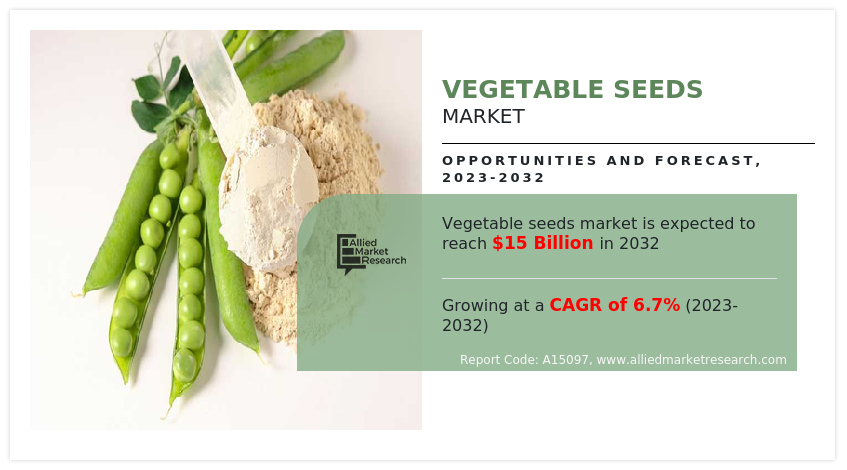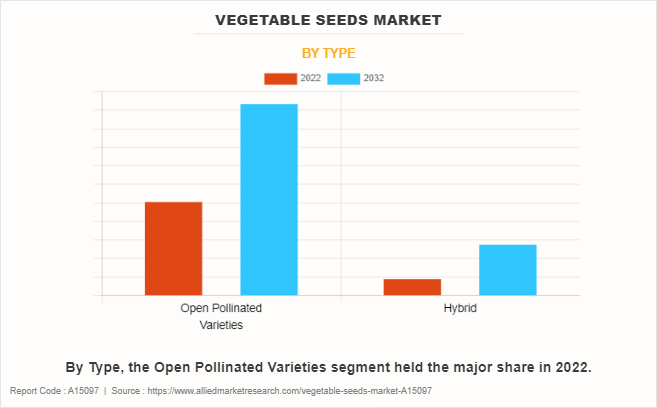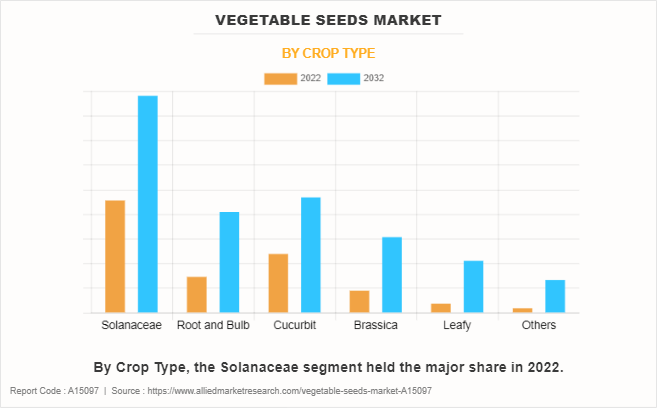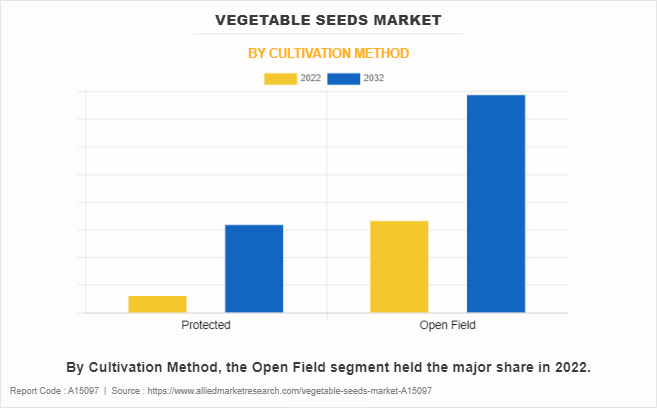Vegetable Seeds Market Research, 2032
The global vegetable seeds market size was valued at $7.9 billion in 2022, and is projected to reach $15 billion by 2032, growing at a CAGR of 6.7% from 2023 to 2032. Vegetables are key to a balanced diet, providing essential nutrients that contribute to overall health. A diet rich in veggies is associated with a lower risk of health issues like obesity and eye-related problems. Including nutrient-packed, non-starchy vegetables such as lettuce and spinach aids in weight management. Recognizing the significance of varied nutrition, there is an increasing need for vegetables. To fulfill this growing demand, farmers globally are in search of premium vegetable seeds for planting, ensuring the cultivation of top-quality, nutritionally beneficial vegetables.

The vegetable seeds industry is projected to be fueled by the increasing healthy eating trends. The growing interest in healthy eating is a major factor boosting the demand for vegetable seeds in the market. As people increasingly prioritize health, there is a greater awareness of the nutritional benefits linked to a diet rich in vegetables. This awareness has sparked a rising demand for a wide variety of vegetables, leading to a simultaneous need for a diverse selection of vegetable seeds. Consumers are actively seeking out unique and specialty vegetables, including heirloom varieties, superfoods, and organic produce. Vegetable seeds that promise specific health benefits or unique flavor profiles are becoming popular among both home gardeners and commercial farmers. As a result, seed producers are responding to this trend by developing and marketing seeds that yield crops with enhanced nutritional content, improved taste, and other health-promoting attributes. The healthy eating trend, therefore, acts as a catalyst for innovation and diversity within the vegetable seeds market, meeting the evolving preferences of health-conscious consumers.
Moreover, the surge in organic and sustainable farming practices is significantly boosting the demand for vegetable seeds. As consumers increasingly prioritize health and environmental sustainability, farmers are transitioning towards organic cultivation methods. Organic farming relies on open-pollinated and non-genetically modified (non-GMO) seeds to produce chemical-free and environmentally friendly crops. This shift emphasizes the importance of high-quality, organic vegetable seeds, driving a growing Vegetable Seeds Market Demand. Moreover, sustainable farming practices, such as agroecology and permaculture, promote diverse crop rotations and companion planting, creating a need for a wide variety of vegetable seeds suited to these specific ecological systems. The demand for seeds that exhibit resilience to pests and diseases without the use of synthetic chemicals is escalating. Seed companies responding to these trends by offering certified organic and sustainably produced seeds contribute to the overall Vegetable Seeds Market Growth, as farmers seek reliable sources for seeds aligned with their commitment to environmentally conscious agriculture.
Additionally, global trade and export opportunities play a pivotal role in driving the demand for the vegetable seeds market. As countries engage in cross-border trade, the demand for specific seed varieties adapted to different climates and growing conditions increases. Exporting nations seek to provide diverse and resilient vegetable seeds to cater to the agricultural needs of importing countries. This fosters innovation in seed development, with an emphasis on traits such as disease resistance, high yield, and adaptability to varying environmental conditions. Furthermore, international trade facilitates the exchange of advanced agricultural technologies and practices, influencing the adoption of modern seed varieties. Seed producers, recognizing the potential for market expansion, invest in research and development to create seeds that meet the specific requirements of diverse regions. The resulting global interdependence in the vegetable seeds market not only boosts economic growth for exporting nations but also enhances agricultural productivity worldwide by promoting the use of cutting-edge seed technologies.
However, Seed patenting issues act as a significant restraint on the vegetable seeds market, impacting both innovation and market accessibility. The process of patenting seeds involves granting exclusive rights to seed developers, restricting the ability of farmers to freely save, exchange, or replant seeds derived from patented varieties. This limitation on seed-saving practices can increase production costs for farmers, as they are compelled to repurchase seeds each planting season, reducing overall profitability.
Segmental Overview
The vegetable seeds market analysis is segmented based on type, crop type, cultivation method, and region. By type, the market is classified into open-pollinated varieties and hybrid. By crop type, the market is classified into Solanaceae, root and bulb, cucurbit, brassica, leafy, and others. By cultivation method, the market is classified into protected and open field. By region, the market is classified into North America (the U.S., Canada, and Mexico), Europe (UK, Russia, France, Italy, Spain, Rest of Europe), Asia-Pacific (China, India, Japan, Australia, and the Rest of Asia-Pacific), and LAMEA (Brazil, Saudi Arabia, South Africa, and Rest of LAMEA).
By Type
By type, the Vegetable Seeds Market Forecastis classified into open-pollinated varieties and hybrid. The open-pollinated varieties segment accounted for a major vegetable seeds market share in 2022 and is expected to grow at a significant CAGR during the forecast period. The demand for Open Pollinated Varieties is rising due to a growing interest in sustainable and traditional farming practices. OPVs offer farmers the ability to save and replant seeds, fostering self-sufficiency and preserving agricultural biodiversity. Consumers, too, appreciate the natural and diverse flavors associated with OPVs, aligning with preferences for locally adapted and heirloom vegetables.

By Crop Type
By crop type, the market is classified into Solanaceae, root and bulb, cucurbit, brassica, leafy, and others. The Solanaceae segment accounted for a major vegetable seeds market share in 2022 and is expected to grow at a significant CAGR during the forecast period. The demand for Solanaceae, encompassing tomatoes, peppers, and eggplants, is rising due to the popularity of these vegetables in global diets. Their versatility, rich flavors, and nutritional value contribute to increased consumer preference.

By Cultivation Method
By cultivation method, the market is classified into protected and open field. The open field segment accounted for a major vegetable seeds market share in 2022 and is expected to grow at a significant CAGR during the forecast period. The rising demand for open field cultivation in the vegetable seeds market is driven by the necessity for large-scale, sustainable farming. Open field methods are crucial for extensive agriculture, enabling cost-effective production on a broad scale. As global food demand increases, open field cultivation remains a preferred choice for its efficiency and traditional approach.

By Region
By region, the market is classified into North America (the U.S., Canada, and Mexico), Europe (UK, Russia, France, Italy, Spain, Rest of Europe), Asia-Pacific (China, India, Japan, Australia, and the Rest of Asia-Pacific), and LAMEA (Brazil, Saudi Arabia, South Africa, and Rest of LAMEA). The Asia-Pacific region accounted for a major vegetable seeds market share in 2022 and is expected to grow at a significant CAGR during the forecast period. In the Asia-Pacific region, the increasing population, expanding urbanization, and a surge in health-conscious consumer habits drive the demand for vegetable seeds. The vegetable seeds market caters to this demand by providing varieties tailored to diverse climates, ensuring high yields, and addressing the evolving dietary preferences of the Asia-Pacific population.
Competitive Landscape
The major players operating in the vegetable seeds market focus on key market strategies, such as mergers, product launches, acquisitions, collaborations, and partnerships. Some of the key players in the vegetable seeds market include Bayer CropScience AG., Syngenta AG, Bayer AG, East-West Seed, Bejo Zaden B.V., namdhari seeds private limited (nspl), Sakata Seed Corporation, Takii & Co., Ltd, Enza Zaden BV, Rijk Zwaan Zaadteelt en Zaadhandel B.V.
Key Benefits for Stakeholders
- This report provides a quantitative analysis of the market segments, current trends, estimations, and dynamics of the vegetable seeds market analysis from 2022 to 2032 to identify the prevailing vegetable seeds market opportunities.
- The market research is offered along with information related to key drivers, restraints, and opportunities.
- Porter's five forces analysis highlights the potency of buyers and suppliers to enable stakeholders make profit-oriented business decisions and strengthen their supplier-buyer network.
- In-depth analysis of the vegetable seeds market segmentation assists to determine the prevailing market opportunities.
- Major countries in each region are mapped according to their revenue contribution to the global market.
- Market player positioning facilitates benchmarking and provides a clear understanding of the present position of the market players.
- The report includes the analysis of the regional as well as global vegetable seeds market trends, key players, market segments, application areas, and market growth strategies.
Vegetable Seeds Market Report Highlights
| Aspects | Details |
| Market Size By 2032 | USD 15 billion |
| Growth Rate | CAGR of 6.7% |
| Forecast period | 2022 - 2032 |
| Report Pages | 543 |
| By Type |
|
| By Crop Type |
|
| By Cultivation Method |
|
| By Region |
|
| Key Market Players | Enza Zaden BV, East-West Seed Group, Takii & Co., Ltd., Namdhari Seeds Pvt. Ltd., Rijk Zwaan Zaadteelt en Zaadhandel B.V., BASF SE, Bayer AG, Bejo Zaden B.V., Sakata Seed Corporation, Syngenta AG |
Analyst Review
According to the insights of the CXOs, the global vegetable seeds market is expected to witness robust growth during the forecast period. This is attributed to the growing global focus on food security. The growing global focus on food security is a key driver propelling the demand for the vegetable seeds market. As populations expand, ensuring a stable and sufficient food supply becomes a critical priority. Vegetable seeds play a crucial role in this context by offering a means to enhance crop productivity and diversity. By cultivating a variety of vegetable crops, farmers can contribute to a more resilient and balanced food system, reducing dependence on a limited range of staple foods.
However, Seed quality concerns act as significant restraints in the vegetable seeds market, impacting market demand and farmer confidence. Poor seed quality, characterized by low germination rates, susceptibility to diseases, and inadequate storage conditions, can result in suboptimal crop yields and financial losses for farmers. Inconsistent performance of seeds may lead to decreased trust in certain varieties, affecting their adoption and demand.
The global vegetable seeds market size was valued at $7.9 billion in 2022, and is projected to reach $15 billion by 2032
The global Vegetable Seeds market is projected to grow at a compound annual growth rate of 6.7% from 2023 to 2032 $15 billion by 2032
Some of the key players in the vegetable seeds market include Bayer CropScience AG., Syngenta AG, Bayer AG, East-West Seed, Bejo Zaden B.V., namdhari seeds private limited (nspl), Sakata Seed Corporation, Takii & Co., Ltd, Enza Zaden BV, Rijk Zwaan Zaadteelt en Zaadhandel B.V.
The Asia-Pacific region accounted for a major vegetable seeds market share in 2022 and is expected to grow at a significant CAGR during the forecast period. In the Asia-Pacific region, the increasing population, expanding urbanization, and a surge in health-conscious consumer habits drive the demand for vegetable seeds.
Research and Development Investments, Focus on Food Security
Loading Table Of Content...
Loading Research Methodology...



